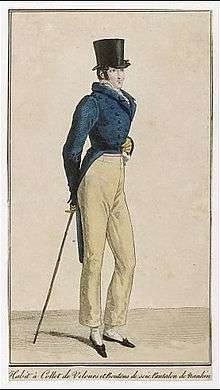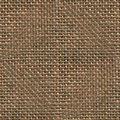Nankeen

Nankeen, also called Nankeen cloth, is a kind of pale yellowish cloth, originally made at Nanjing from a yellow variety of cotton, but subsequently manufactured from ordinary cotton which is then dyed. Also in the plural a piece or variety of this cloth.[1]
The term blue nankeen describes hand-printed fabric of artistic refinement and primitive simplicity, which originated on the Silk Road over three thousand years ago.
Hand-carved stencils, originally made from wood but now from heavy paper, are prepared and a mix of soya bean flour and slaked lime is applied through the openings of the stencil onto the 100% cotton fabric. When dry, the fabric is then dipped numerous times into the large tubs containing the indigo dye. After the desired colour is achieved and the fabric has dried, the paste is scraped off, revealing the white patterns on the blue cloth. The fabric is then washed, dried, and ironed before fabrication.
Derived uses
Nankeen also refers to:
- Trousers made of nankeen (singular or plural).
- A pale yellow or buff; the colour of nankeen.
- Bobbin lace made from unbleached silk (usually in plural form nankins).
- A kind of usually blue and white porcelain of Chinese style, originally exported to Europe from Nanking and later copied by European potters.
- Of the colour of nankeen; pale yellow or buff; also from their colour, part of the name of many animals and plants (chiefly Australian).
- Nankeen gum, the bimble box, Eucalyptus populnea, a tree of eastern Australia having a fibrous bark and glossy green leaves.
- Nankeen kestrel, also called nankeen hawk, the Australian kestrel, Falco cenchroides, a small falcon found in Australia and neighbouring islands.
- Nankeen night heron, also called nankeen bird, nankeen crane, nankeen heron, rufous night heron or its scientific name Nycticorax caledonicus, a stocky nocturnal heron found in Australasia and Indonesia
See also
References
- ↑ Oxford English Dictionary
External links
- New York Times Travel Guide: Chinese Printed Blue Nankeen Exhibition Hall
- Photo explanation of the Nankeen dying process


.svg.png)